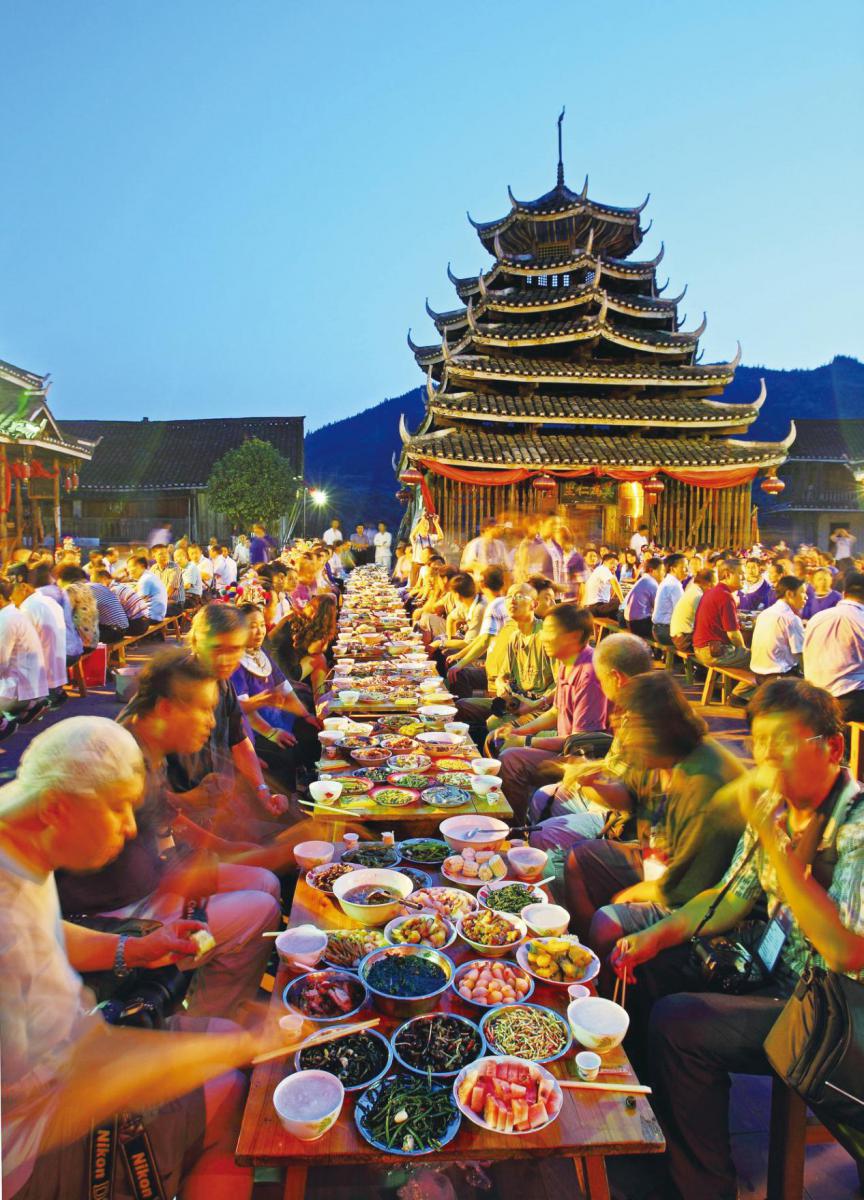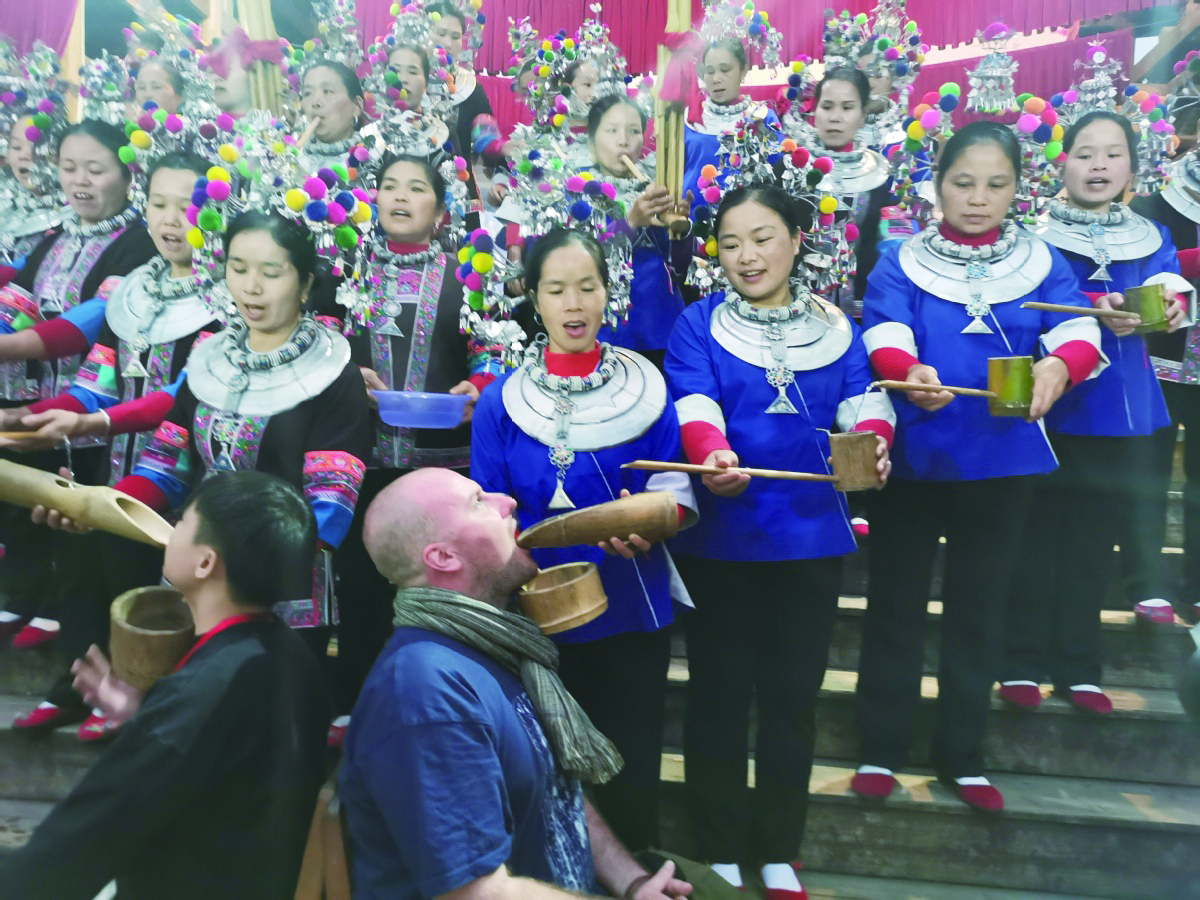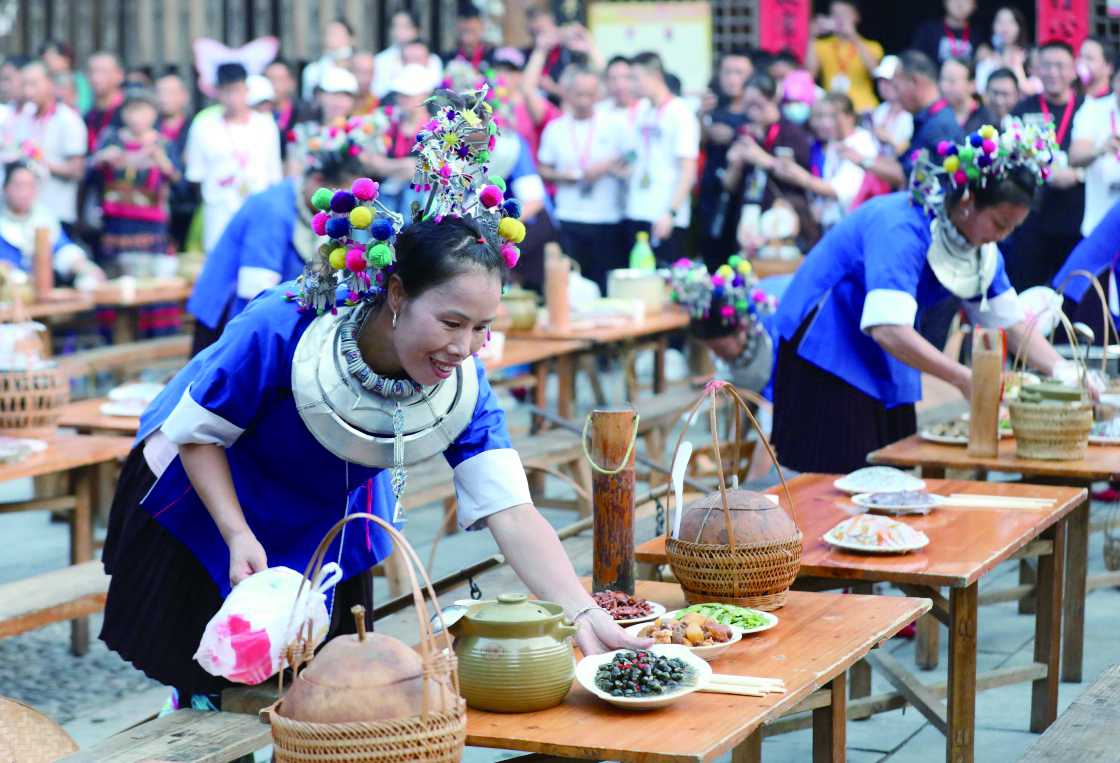Eat 100 Meals Together 100 Heart: Dong People’s Hundred-family Banquet
Publication time:2022-12-12 17:50:20
By Wei Yingling
Food and hospitality go hand in hand in many cultures. Holding banquets and serving homemade cuisine were how people started to trust each other. In Sanjiang County, the members of the Dong ethnic group know how to treat their guests with a rich spread. Whenever honorable guests and friends visit, they set long tables and bring out lip-smacking dishes. This is Bai Jia Yan, or Hundred Families Banquet which has been circulating in Sanjiang County for several centuries of history. What’s so magical about it?
The most courteous reception
As its name implies, Bai Jia Yan is a culinary ceremony prepared by one hundred or so Dong families. Each family cooks some dishes and takes them to the banquet which is usually set in the outdoor square in front of the Sanjiang Drum Tower. In the past, when guests visited, Dong people got together and brought out rice wine, salted fish, and meat to treat their guests in the middle of the village to avoid their guests being unable to visit each family due to a short stay and the lack of transportation facilities. As time goes by, the banquet has become a requisite activity when grand festivals approach or important visitors come from far.


Dong people highly value hospitality, requiring that no instant ingredients are used in their cuisine and that the utensils for serving should be ceramic, wooden, or other traditional dining equipment with Dong characteristics. As a sign of respect, they put on their traditional costumes, play Lusheng, sing Dong’s Grand Song, and invite guests to dance around the long table. Dong people like straightforward friends, so if the guest accepts the invitation heartily, they make buddies with their Dong hosts.
A feast that isn’t only for the tummies, but also the eyes
There is a unique procedure for partaking in the Bai Jia Yan. Before guests enter Dong’s village, Dong ladies will form a line to block the way in front of the entrance and ask tourists to join them in singing. This greeting practice is termed in Chinese as “Dui Ge,” literally meaning both sides sing songs alternately. Dong ladies set up barriers and sing several excuses for closing the route. When a guest responds to a question by singing, the ladies remove one of the barriers until the barriers are entirely
gone. At this point, the girl from the main village will take up a bullhorn filled with wine. After toasting the guests one by one, she leads them into the village. With an order given by the village elder, Bai Jia Yan officially kicks off.

Instead of sitting down to enjoy the feast, diners will be encouraged to bounce from table to table to try every dish and converse with locals. They will experience a toasting process from the locals. Four to five Dong ladies will team up, carry bowls of sticky rice wine, and pour the wine into the mouth of the guests continuously via the bowls from top to bottom until they finish the whole pot. This toast style is known as “running water from the high mountain.” During this period, the ladies will sing a lovely drinking song together. However, those who do not feel like drinking won’t be forced by Dong people. They never want to embarrass a guest, only to show the warmth of their welcome.

A culinary adventure
For foodies, having a meal in Dong’s village would be an adventure to sample brand-new delicacies. What makes Dong cuisine unique is its emphasis on a sour taste. Dong people are obsessed with sour flavor, so they pickle practically everything edible, such as fish, pork, and vegetables in clay jars. When it comes to the Dong pickles, people who have tasted the Dong-style kipper are full of praise for its greasy but not too fatty flesh. Diners can’t help but feel mouth-watering when they think of it. What’s more unexpected is that a Dong-style kipper can be preserved for 10 to 30 years.

Aside from food, Dong’s oil tea is also worth noticing. It is perhaps better described as a “tea soup” since it is thicker than normal tea and contains solid ingredients, such as peanuts and popcorn. Each guest will be served a bowl and one chopstick. The diner who places the chopstick across his bowl indicates he is done drinking so that the host can stop filling his bowl. The first bowl is always served to the oldest member of the village or the guest, followed thereafter from the oldest to the youngest. Same as drinking regular tea, out of politeness, dinners wait to sip their tea until everyone has been served, and the hostess indicates you may begin drinking by saying “please”. With its refreshing but slightly bitter taste, the oil tea is also recognized as “Dong’s Coffee.”
It is believed by locals that someone who eats the feats can enjoy longevity, receive a fortune, and achieve their dreams. If you happen in a Bai Jia Yan, feel free to accept the toast of “blocked-gate” wine, join in the rounds of singing songs, and dance with Dong people around the tables. You will feel like a member of the group and link to the sense of unity, friendship, sincerity, and joy that the “hundred families” implied.

